Summary :
- Merck, known as MSD outside the United States and Canada, and Eisai announced that the Japanese Ministry of Health, Labour and Welfare (MHLW) has approved the combination of Keytruda, Merck’s anti-PD-1 therapy, plus Lenvima, the orally available multiple receptor tyrosine kinase inhibitor discovered by Eisai, for the treatment of patients with unresectable, advanced or recurrent endometrial carcinoma that progressed after cancer chemotherapy.
- This approval marks the first time the combination of Keytruda plus Lenvima has been approved in Japan. Keytruda plus Lenvima is now approved in Japan, the US and Europe for certain types of advanced endometrial carcinoma.
- In addition to advanced endometrial carcinoma, Merck and Eisai continue to study the Keytruda plus Lenvima combination across several types of cancer with more than 20 clinical trials.
- Keytruda is indicated for the treatment of patients with unresectable or metastatic melanoma.
- Lenvima, discovered and developed by Eisai, is a multiple receptor tyrosine kinase inhibitor that inhibits the kinase activities of vascular endothelial growth factor (VEGF) receptors VEGFR1 (FLT1), VEGFR2 (KDR), and VEGFR3 (FLT4).
Merck, known as MSD outside the United States and Canada, and Eisai announced that the Japanese Ministry of Health, Labour and Welfare (MHLW) has approved the combination of Keytruda, Merck’s anti-PD-1 therapy, plus Lenvima, the orally available multiple receptor tyrosine kinase inhibitor discovered by Eisai, for the treatment of patients with unresectable, advanced or recurrent endometrial carcinoma that progressed after cancer chemotherapy.
This approval marks the first time the combination of Keytruda plus Lenvima has been approved in Japan. Keytruda plus Lenvima is now approved in Japan, the US and Europe for certain types of advanced endometrial carcinoma.
“Rates of endometrial carcinoma have been steadily increasing in Japan each year, and there are limited options for patients who are diagnosed at an advanced stage or find their disease has returned,” said Dr. Gregory Lubiniecki, vice president, clinical research, Merck Research Laboratories. “With today’s approval, patients in Japan with unresectable, advanced or recurrent endometrial carcinoma now have the option of the first immunotherapy and tyrosine kinase inhibitor combination that has significantly improved overall survival and progression-free survival compared to chemotherapy.”
“This is the first approval of the Keytruda plus Lenvima combination in Japan,” said Terushige Iike, president, Eisai Japan at Eisai. “We thank the patients, families and healthcare providers who made this approval possible. By delivering this combination therapy, we are proud to provide patients with advanced or recurrent endometrial carcinoma an additional treatment option.”
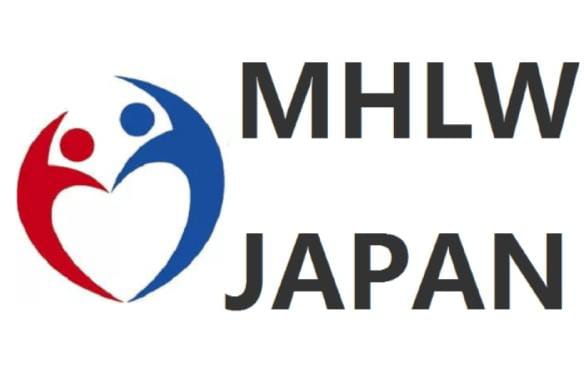
Japanese MHLW approves Keytruda Plus Lenvima to treat Unresectable, Advanced or Recurrent Endometrial Carcinoma
The approval is based on results from the pivotal phase 3 KEYNOTE-775/Study 309 trial, in which Keytruda plus Lenvima demonstrated statistically significant improvements in overall survival (OS), reducing the risk of death by 38% (HR=0.62 [95% CI, 0.51-0.75]; p<0.0001), and progression-free survival (PFS), reducing the risk of disease progression or death by 44% (HR=0.56 [95% CI, 0.47-0.66]; p<0.0001), versus chemotherapy (investigator’s choice of doxorubicin or paclitaxel). The median OS was 18.3 months (95% CI, 15.2-20.5) for Keytruda plus Lenvima versus 11.4 months (95% CI, 10.5-12.9) for chemotherapy. The median PFS was 7.2 months (95% CI, 5.7-7.6) for Keytruda plus Lenvima versus 3.8 months (95% CI, 3.6-4.2) for chemotherapy.
The Japanese package inserts for Keytruda plus Lenvima note that in the KEYNOTE-775/Study 309 trial, adverse reactions were observed in 395 patients (97.3%) out of the safety analysis set of 406 patients (including 51 out of 52 Japanese patients) receiving Keytruda plus Lenvima. The most common adverse reactions were hypertension in 249 patients (61.3%), hypothyroidism in 222 patients (54.7%), diarrhoea in 171 patients (42.1%), nausea in 158 patients (38.9%), decreased appetite in 151 patients (37.2%), fatigue in 113 patients (27.8%), proteinuria in 105 patients (25.9%), vomiting in 98 patients (24.1%), weight decreased in 91 patients (22.4%), arthralgia in 87 patients (21.4%) and palmar-plantar erythrodysesthesia syndrome in 84 patients (20.7%).
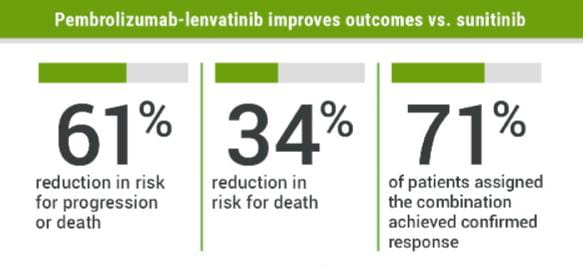
Endometrial carcinoma begins in the inner lining of the uterus, which is known as the endometrium, and accounts for more than 90% of uterine cancers. In Japan, it is estimated there were more than 17,000 new cases of uterine cancer and more than 3,000 deaths in 2020 alone. Keytruda plus Lenvima have each received orphan drug designation in Japan for endometrial carcinoma.
In addition to advanced endometrial carcinoma, Merck and Eisai continue to study the Keytruda plus Lenvima combination across several types of cancer with more than 20 clinical trials.
The approval was based on data from KEYNOTE-775/Study 309 (ClinicalTrials.gov, NCT03517449), a Phase 3, multicenter, open-label, randomized, active-controlled study conducted in 827 patients (including 104 Japanese patients) with advanced endometrial carcinoma who had been previously treated with at least one prior platinum-based chemotherapy regimen in any setting, including in the neoadjuvant and adjuvant settings. The primary efficacy outcome measures were OS, and PFS as assessed by blinded independent central review (BICR) according to RECIST v1.1.
Patients were randomized 1:1 to receive Keytruda (200 mg intravenously every three weeks) plus Lenvima (20 mg orally once daily) or investigator’s choice, consisting of either doxorubicin (60 mg/m2 every three weeks) or paclitaxel (80 mg/m2 given weekly, three weeks on/one week off). Treatment with Keytruda plus Lenvima continued until RECIST v1.1-defined progression of disease as verified by BICR, unacceptable toxicity, or for Keytruda, a maximum of 24 months. Administration of Keytruda plus Lenvima was permitted beyond RECIST-defined disease progression if the treating investigator considered the patient to be deriving clinical benefit and the treatment was tolerated.
Keytruda is an anti-programmed death receptor-1 (PD-1) therapy that works by increasing the ability of the body’s immune system to help detect and fight tumor cells. Keytruda is a humanized monoclonal antibody that blocks the interaction between PD-1 and its ligands, PD-L1 and PD-L2, thereby activating T lymphocytes which may affect both tumor cells and healthy cells.
Merck has the industry’s largest immuno-oncology clinical research programME. There are currently more than 1,600 trials studying Keytruda across a wide variety of cancers and treatment settings. The Keytruda clinical program seeks to understand the role of Keytruda across cancers and the factors that may predict a patient’s likelihood of benefitting from treatment with Keytruda, including exploring several different biomarkers.
Keytruda is indicated for the treatment of patients with unresectable or metastatic melanoma.
Keytruda is indicated for the adjuvant treatment of adult and pediatric (12 years and older) patients with stage IIB, IIC, or III melanoma following complete resection.
Lenvima, discovered and developed by Eisai, is a multiple receptor tyrosine kinase inhibitor that inhibits the kinase activities of vascular endothelial growth factor (VEGF) receptors VEGFR1 (FLT1), VEGFR2 (KDR), and VEGFR3 (FLT4). LENVIMA inhibits other kinases that have been implicated in pathogenic angiogenesis, tumour growth, and cancer progression in addition to their normal cellular functions, including fibroblast growth factor (FGF) receptors FGFR1-4, the platelet derived growth factor receptor alpha (PDGFRa), KIT, and RET. The combination of Lenvima and everolimus showed increased anti-angiogenic and anti-tumor activity as demonstrated by decreased human endothelial cell proliferation, tube formation, and VEGF signalling in vitro and tumor volume in mouse xenograft models of human renal cell cancer greater than each drug alone. In syngeneic mouse tumour models, the combination of lenvatinib with an anti-PD-1 monoclonal antibody decreased tumour-associated macrophages, increased activated cytotoxic T cells, and demonstrated greater antitumor activity compared to either treatment alone.
In March 2018, Eisai and Merck, known as MSD outside the United States and Canada, through an affiliate, entered into a strategic collaboration for the worldwide co-development and co-commercialization of Lenvima. Under the agreement, the companies will jointly develop, manufacture and commercialize Lenvima, both as monotherapy and in combination with Merck’s anti-PD-1 therapy Keytruda.
Keytruda
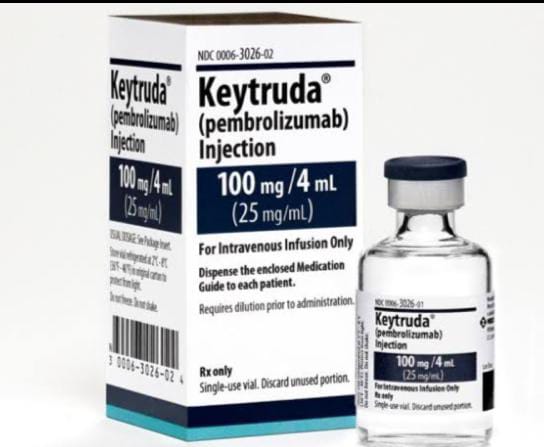
About KEYTRUDA® (pembrolizumab) Injection, 100 mg
KEYTRUDA is an anti-programmed death receptor-1 (PD-1) therapy that works by increasing the ability of the body’s immune system to help detect and fight tumor cells. KEYTRUDA is a humanized monoclonal antibody that blocks the interaction between PD-1 and its ligands, PD-L1 and PD-L2, thereby activating T lymphocytes which may affect both tumor cells and healthy cells.
Merck has the industry’s largest immuno-oncology clinical research program. There are currently more than 1,600 trials studying KEYTRUDA across a wide variety of cancers and treatment settings. The KEYTRUDA clinical program seeks to understand the role of KEYTRUDA across cancers and the factors that may predict a patient’s likelihood of benefitting from treatment with KEYTRUDA, including exploring several different biomarkers.
Selected KEYTRUDA® (pembrolizumab) Indications in the U.S.
Melanoma
KEYTRUDA is indicated for the treatment of patients with unresectable or metastatic melanoma.
KEYTRUDA is indicated for the adjuvant treatment of patients with melanoma with involvement of lymph node(s) following complete resection.
Non-Small Cell Lung Cancer
KEYTRUDA, in combination with pemetrexed and platinum chemotherapy, is indicated for the first-line treatment of patients with metastatic nonsquamous non-small cell lung cancer (NSCLC), with no EGFR or ALK genomic tumor aberrations.
KEYTRUDA, in combination with carboplatin and either paclitaxel or paclitaxel protein-bound, is indicated for the first-line treatment of patients with metastatic squamous NSCLC.
KEYTRUDA, as a single agent, is indicated for the first-line treatment of patients with NSCLC expressing PD-L1 [tumor proportion score (TPS) ≥1%] as determined by an FDA-approved test, with no EGFR or ALK genomic tumor aberrations, and is:
- stage III where patients are not candidates for surgical resection or definitive chemoradiation,
KEYTRUDA, as a single agent, is indicated for the treatment of patients with metastatic NSCLC whose tumors express PD-L1 (TPS ≥1%) as determined by an FDA-approved test, with disease progression on or after platinum-containing chemotherapy. Patients with EGFR or ALK genomic tumor aberrations should have disease progression on FDA-approved therapy for these aberrations prior to receiving KEYTRUDA.
Head and Neck Squamous Cell Cancer
KEYTRUDA, in combination with platinum and fluorouracil (FU), is indicated for the first-line treatment of patients with metastatic or with unresectable, recurrent head and neck squamous cell carcinoma (HNSCC).
KEYTRUDA, as a single agent, is indicated for the first-line treatment of patients with metastatic or with unresectable, recurrent HNSCC whose tumors express PD-L1 [combined positive score (CPS ≥1)] as determined by an FDA-approved test
KEYTRUDA, as a single agent, is indicated for the treatment of patients with recurrent or metastatic HNSCC with disease progression on or after platinum-containing chemotherapy.
Classical Hodgkin Lymphoma
KEYTRUDA is indicated for the treatment of adult patients with relapsed or refractory classical Hodgkin lymphoma (cHL).
KEYTRUDA is indicated for the treatment of pediatric patients with refractory cHL, or cHL that has relapsed after 2 or more lines of therapy.
Primary Mediastinal Large B-Cell Lymphoma
KEYTRUDA is indicated for the treatment of adult and pediatric patients with refractory primary mediastinal large B-cell lymphoma (PMBCL), or who have relapsed after 2 or more prior lines of therapy. KEYTRUDA is not recommended for treatment of patients with PMBCL who require urgent cytoreductive therapy.
Urothelial Carcinoma
KEYTRUDA is indicated for the treatment of patients with locally advanced or metastatic urothelial carcinoma (mUC):
- who are not eligible for any platinum-containing chemotherapy, or
- who have disease progression during or following platinum-containing chemotherapy or within 12 months of neoadjuvant or adjuvant treatment with platinum-containing chemotherapy.
Non-muscle Invasive Bladder Cancer
KEYTRUDA is indicated for the treatment of patients with Bacillus Calmette-Guerin (BCG)-unresponsive, high-risk, non-muscle invasive bladder cancer (NMIBC) with carcinoma in situ (CIS) with or without papillary tumors who are ineligible for or have elected not to undergo cystectomy.
Microsatellite Instability-High or Mismatch Repair Deficient Cancer
KEYTRUDA is indicated for the treatment of adult and pediatric patients with unresectable or metastatic microsatellite instability-high (MSI-H) or mismatch repair deficient (dMMR) solid tumors that have progressed following prior treatment and who have no satisfactory alternative treatment options.
This indication is approved under accelerated approval based on tumor response rate and durability of response. Continued approval for this indication may be contingent upon verification and description of clinical benefit in the confirmatory trials. The safety and effectiveness of KEYTRUDA in pediatric patients with MSI-H central nervous system cancers have not been established
Microsatellite Instability-High or Mismatch Repair Deficient Colorectal Cancer
KEYTRUDA is indicated for the treatment of patients with unresectable or metastatic MSI-H or dMMR colorectal cancer (CRC).
Gastric Cancer
KEYTRUDA, in combination with trastuzumab, fluoropyrimidine- and platinum-containing chemotherapy, is indicated for the first-line treatment of patients with locally advanced unresectable or metastatic HER2-positive gastric or gastroesophageal junction (GEJ) adenocarcinoma.
This indication is approved under accelerated approval based on tumor response rate and durability of response. Continued approval for this indication may be contingent upon verification and description of clinical benefit in the confirmatory trials.
Esophageal Cancer
KEYTRUDA is indicated for the treatment of patients with locally advanced or metastatic esophageal or GEJ (tumors with epicenter 1 to 5 centimeters above the GEJ) carcinoma that is not amenable to surgical resection or definitive chemoradiation either:
- in combination with platinum- and fluoropyrimidine-based chemotherapy, or
- as a single agent after one or more prior lines of systemic therapy for patients with tumors of squamous cell histology that express PD-L1 (CPS ≥10) as determined by an FDA-approved test.
Cervical Cancer
KEYTRUDA, in combination with chemotherapy, with or without bevacizumab, is indicated for the treatment of patients with persistent, recurrent, or metastatic cervical cancer whose tumors express PD-L1 (CPS ≥1) as determined by an FDA-approved test.
KEYTRUDA, as a single agent, is indicated for the treatment of patients with recurrent or metastatic cervical cancer with disease progression on or after chemotherapy whose tumors express PD-L1 (CPS ≥1) as determined by an FDA-approved test.
Hepatocellular Carcinoma
KEYTRUDA is indicated for the treatment of patients with hepatocellular carcinoma (HCC) who have been previously treated with sorafenib. This indication is approved under accelerated approval based on tumor response rate and durability of response. Continued approval for this indication may be contingent upon verification and description of clinical benefit in the confirmatory trials.
Merkel Cell Carcinoma
KEYTRUDA is indicated for the treatment of adult and pediatric patients with recurrent locally advanced or metastatic Merkel cell carcinoma (MCC). This indication is approved under accelerated approval based on tumor response rate and durability of response. Continued approval for this indication may be contingent upon verification and description of clinical benefit in the confirmatory trials.
Renal Cell Carcinoma
KEYTRUDA, in combination with axitinib, is indicated for the first-line treatment of adult patients with advanced renal cell carcinoma (RCC).
KEYTRUDA, in combination with LENVIMA, is indicated for the first-line treatment of adult patients with advanced RCC.
KEYTRUDA is indicated for the adjuvant treatment of patients with renal cell carcinoma (RCC) at intermediate-high or high risk of recurrence following nephrectomy, or following nephrectomy and resection of metastatic lesions.
Endometrial Carcinoma
KEYTRUDA, in combination with LENVIMA, is indicated for the treatment of patients with advanced endometrial carcinoma that is not MSI-H or dMMR, who have disease progression following prior systemic therapy in any setting and are not candidates for curative surgery or radiation.
Tumor Mutational Burden-High Cancer
KEYTRUDA is indicated for the treatment of adult and pediatric patients with unresectable or metastatic tumor mutational burden-high (TMB-H) [≥10 mutations/megabase] solid tumors, as determined by an FDA-approved test, that have progressed following prior treatment and who have no satisfactory alternative treatment options. This indication is approved under accelerated approval based on tumor response rate and durability of response. Continued approval for this indication may be contingent upon verification and description of clinical benefit in the confirmatory trials. The safety and effectiveness of KEYTRUDA in pediatric patients with TMB-H central nervous system cancers have not been established.
Cutaneous Squamous Cell Carcinoma
KEYTRUDA is indicated for the treatment of patients with recurrent or metastatic cutaneous squamous cell carcinoma (cSCC) or locally advanced cSCC that is not curable by surgery or radiation.
Triple-Negative Breast Cancer
KEYTRUDA is indicated for the treatment of patients with high-risk early-stage triple-negative breast cancer (TNBC) in combination with chemotherapy as neoadjuvant treatment, and then continued as a single agent as adjuvant treatment after surgery.
KEYTRUDA, in combination with chemotherapy, is indicated for the treatment of patients with locally recurrent unresectable or metastatic TNBC whose tumors express PD-L1 (CPS ≥10) as determined by an FDA-approved test.
Selected Important Safety Information for KEYTRUDA
Severe and Fatal Immune-Mediated Adverse Reactions
KEYTRUDA is a monoclonal antibody that belongs to a class of drugs that bind to either the PD-1 or the PD-L1, blocking the PD-1/PD-L1 pathway, thereby removing inhibition of the immune response, potentially breaking peripheral tolerance and inducing immune-mediated adverse reactions. Immune-mediated adverse reactions, which may be severe or fatal, can occur in any organ system or tissue, can affect more than one body system simultaneously, and can occur at any time after starting treatment or after discontinuation of treatment. Important immune-mediated adverse reactions listed here may not include all possible severe and fatal immune-mediated adverse reactions.
Monitor patients closely for symptoms and signs that may be clinical manifestations of underlying immune-mediated adverse reactions. Early identification and management are essential to ensure safe use of anti–PD-1/PD-L1 treatments. Evaluate liver enzymes, creatinine, and thyroid function at baseline and periodically during treatment. For patients with TNBC treated with KEYTRUDA in the neoadjuvant setting, monitor blood cortisol at baseline, prior to surgery, and as clinically indicated. In cases of suspected immune-mediated adverse reactions, initiate appropriate workup to exclude alternative etiologies, including infection. Institute medical management promptly, including specialty consultation as appropriate.
Withhold or permanently discontinue KEYTRUDA depending on severity of the immune-mediated adverse reaction. In general, if KEYTRUDA requires interruption or discontinuation, administer systemic corticosteroid therapy (1 to 2 mg/kg/day prednisone or equivalent) until improvement to Grade 1 or less. Upon improvement to Grade 1 or less, initiate corticosteroid taper and continue to taper over at least 1 month. Consider administration of other systemic immunosuppressants in patients whose adverse reactions are not controlled with corticosteroid therapy.
Immune-Mediated Pneumonitis
KEYTRUDA can cause immune-mediated pneumonitis. The incidence is higher in patients who have received prior thoracic radiation. Immune-mediated pneumonitis occurred in 3.4% (94/2799) of patients receiving KEYTRUDA, including fatal (0.1%), Grade 4 (0.3%), Grade 3 (0.9%), and Grade 2 (1.3%) reactions. Systemic corticosteroids were required in 67% (63/94) of patients. Pneumonitis led to permanent discontinuation of KEYTRUDA in 1.3% (36) and withholding in 0.9% (26) of patients. All patients who were withheld reinitiated KEYTRUDA after symptom improvement; of these, 23% had recurrence. Pneumonitis resolved in 59% of the 94 patients.
Pneumonitis occurred in 8% (31/389) of adult patients with cHL receiving KEYTRUDA as a single agent, including Grades 3-4 in 2.3% of patients. Patients received high-dose corticosteroids for a median duration of 10 days (range: 2 days to 53 months). Pneumonitis rates were similar in patients with and without prior thoracic radiation. Pneumonitis led to discontinuation of KEYTRUDA in 5.4% (21) of patients. Of the patients who developed pneumonitis, 42% interrupted KEYTRUDA, 68% discontinued KEYTRUDA, and 77% had resolution.
Immune-Mediated Colitis
KEYTRUDA can cause immune-mediated colitis, which may present with diarrhea. Cytomegalovirus infection/reactivation has been reported in patients with corticosteroid-refractory immune-mediated colitis. In cases of corticosteroid-refractory colitis, consider repeating infectious workup to exclude alternative etiologies. Immune-mediated colitis occurred in 1.7% (48/2799) of patients receiving KEYTRUDA, including Grade 4 (<0.1%), Grade 3 (1.1%), and Grade 2 (0.4%) reactions. Systemic corticosteroids were required in 69% (33/48); additional immunosuppressant therapy was required in 4.2% of patients. Colitis led to permanent discontinuation of KEYTRUDA in 0.5% (15) and withholding in 0.5% (13) of patients. All patients who were withheld reinitiated KEYTRUDA after symptom improvement; of these, 23% had recurrence. Colitis resolved in 85% of the 48 patients.
Hepatotoxicity and Immune-Mediated Hepatitis
KEYTRUDA can cause immune-mediated hepatitis. Immune-mediated hepatitis occurred in 0.7% (19/2799) of patients receiving KEYTRUDA, including Grade 4 (<0.1%), Grade 3 (0.4%), and Grade 2 (0.1%) reactions. Systemic corticosteroids were required in 68% (13/19) of patients; additional immunosuppressant therapy was required in 11% of patients. Hepatitis led to permanent discontinuation of KEYTRUDA in 0.2% (6) and withholding in 0.3% (9) of patients. All patients who were withheld reinitiated KEYTRUDA after symptom improvement; of these, none had recurrence. Hepatitis resolved in 79% of the 19 patients.
Mechanism of Action
Pembrolizumab is a highly selective humanized monoclonal IgG4 antibody directed against the PD-1 receptor on the cell surface. The drug blocks the PD-1 receptor, preventing binding and activation of PD-L1 and PD-L2. This mechanism causes the activation of T-cell mediated immune responses against tumor cells.
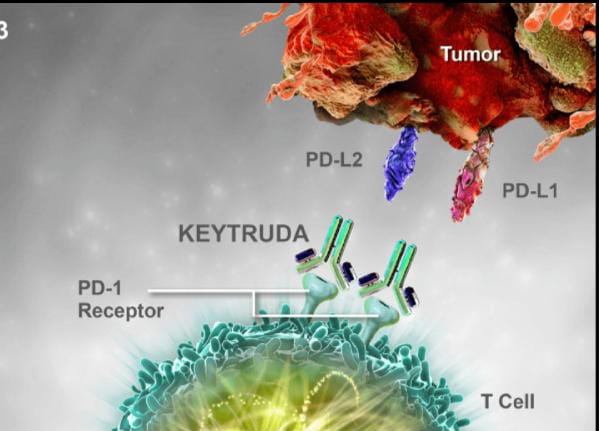
Keytruda Mechanism of Action
Lenvima
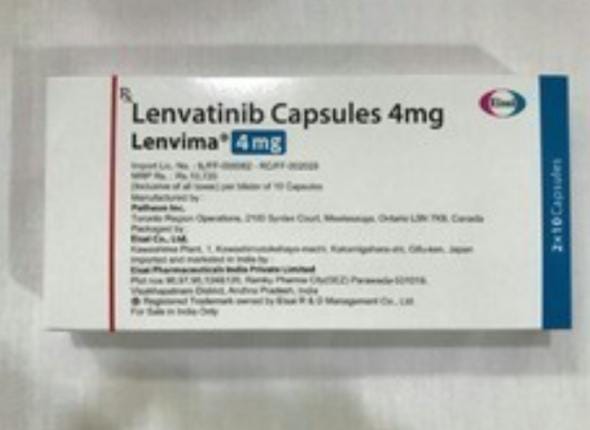
LENVIMA® (lenvatinib) is a prescription medicine that is used to treat people with certain kinds of cancer.
- LENVIMA is used by itself to treat differentiated thyroid cancer (DTC), a type of thyroid cancer that can no longer be treated with radioactive iodine and is progressing.
- LENVIMA is used along with another medicine called everolimus to treat adults with a type of kidney cancer called advanced renal cell carcinoma (RCC) after one course of treatment with another anti-cancer medicine.
- LENVIMA is used by itself as the first treatment for a type of liver cancer called hepatocellular carcinoma (HCC) when it cannot be removed by surgery.
It is not known if LENVIMA is safe and effective in children.
What is the mechanism of action of lenvatinib?
- Lenvatinib is classified as an oral multiple receptor tyrosine kinase (RTK) inhibitor that blocks certain proteins that boost cancer cell growth.
- It is also called a Vascular endothelial growth factor (VEGF)/ vascular endothelial growth factor receptor (VEGFR) inhibitor. It blocks signals to help slow down the growth of new blood vessels from existing blood vessels (angiogenesis) that support the tumor’s growth.
- Abnormal angiogenesis can occur in cancer, degenerative eye diseases and other medical conditions that involve inflammation.
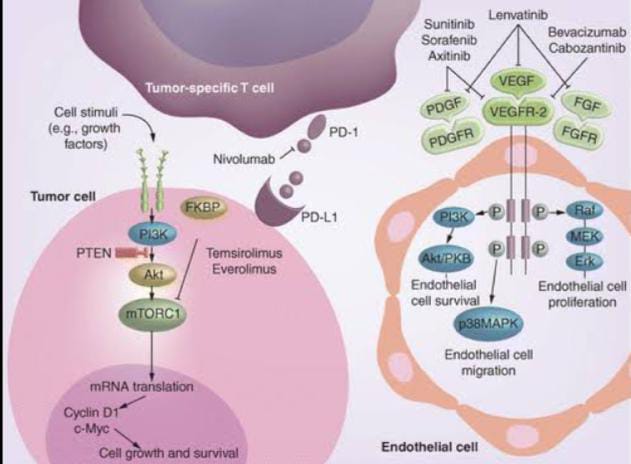
Lenvima Mechanism of Action
The FDA first approved Eisai’s Lenvima in February 2015. It is approved for the treatment of differentiated thyroid cancer, advanced renal cell carcinoma (kidney cancer), inoperable hepatocellular (liver) carcinoma (HCC), and endometrial cancer.
Bottom Line
- Lenvatinib (brand name: Lenvima) is considered an oral targeted treatment, not a chemotherapy drug.
- It blocks proteins on cells and signals directed at blood vessels to help slow down the growth and spread of certain types of cancer.
- It is approved for the treatment of certain forms of thyroid cancer, kidney cancer, liver cancer and endometrial cancer.

